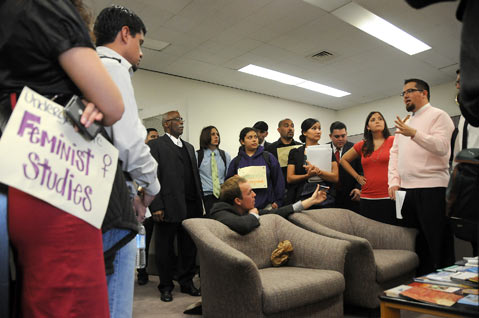Academic Freedom Under Attack?
UCSB Students Protest ADL Visit over Alleged Anti-Semitic Email

Aperceived threat to academic freedom so inflamed a group of UCSB students on Thursday, April 30, that not even getting stuck in an elevator could stop them. A well-dressed group of students descended upon the office of Chancellor Henry Yang in UCSB’s Cheadle Hall to discuss charges of anti-Semitism levied against sociology professor William Robinson, who sparked controversy by sending an email to students in his Sociology of Globalization class in which he compared Israel’s occupation of Gaza to the Nazi ghettoization of Jews in Warsaw during World War II, although he said he was not directly comparing Israelis to Nazis.
But the students’ mission wasn’t accomplished without a minor hiccup-13 of them became separated from the rest of the group when the elevator they were taking jammed for about 20 minutes. Once extricated from the hot, cramped compartment by university service workers, the students finally arrived at Yang’s office.
The trek proved fruitless, at least in the short term; the Committee to Defend Academic Freedom at UCSB, as the group calls itself, was denied a meeting with Yang, who was in Washington, D.C. But Kevin McCauley, Yang’s executive assistant, fielded objections from the students that the university’s administration would decline to meet with a campus-based group concerned about academic freedom but would speak with an external organization. In this case, they were referring to the Anti-Defamation League (ADL). Its national director, Abraham Foxman, spoke with UCSB administrators in March about several topics, including the controversial email. Faculty members who attended that meeting say that the intended objective was to discuss with Foxman goals and issues shared by ADL and the campus, but that the conversation ended up centering around Robinson’s email. “When the meeting started, Foxman quickly launched into what I would call a rant about what he said was an anti-Semitic email that Robinson sent to his class,” recalled history professor Harold Marcuse.
David Marshall, the Dean of Humanities and Fine Arts, was there, too, and said that most people at the meeting were unfamiliar with Robinson’s situation. “This now very public incident was a little bit under the radar when the meeting occurred in March,” he said.
The email included pictures of German troops during World War II side-by-side with those of Israeli soldiers, as well as Robinson’s commentary relating similarities he saw between Gaza and the Warsaw ghetto. Two of the 80 students to receive the email-Rebecca Joseph and Tova Hausman-were offended and reported it to the Los Angeles-based Simon Wiesenthal Center as being anti-Semitic. In the formal complaints filed by the students, one said the student had contacted Robinson by email prior to filing the complaint, but received a response indicating that the email he had sent was for personal information only and not related to course material.
Robinson, who is Jewish, claims he had a right to send the email. “Controversy is at the heart of academic inquiry,” said Robinson, adding that an American Society of University Professors document titled Freedom in the Classroom states that students should have their beliefs challenged during academic study. “Historical comparison is at the heart of academic freedom,” Robinson said. He characterized the ADL as an “aggressive right-wing organization that is exercising thought control and represents a danger to the Jewish community at large.”
Separate from the debate over the merits of the email now lies a second one: How UCSB handles disputes over academic freedom. Robinson and his supporters assert that issues such as this one should be dealt with internally, as part of a department’s process of maintaining relevant curriculum. “The right of the faculty member to impart material that is provocative or offensive is part of the academic process, and students should have the right to respond,” said Dick Flacks, a professor emeritus in UCSB’s sociology department as well as an active member of Santa Barbara’s Jewish community. “These students went to outside sources-the Simon Wiesenthal Center and ADL-and those groups turned this into a case where this professor was guilty of discrimination. A university is supposed to be a place of dialogue, not a place of allegations and judicial proceedings,” said Flacks, who also said he didn’t blame the objecting students for the current situation.
Foxman said that he brought up the Robinson issue at the March faculty lunch, but denied pressuring faculty and administration, as has been charged by several of Robinson’s supporters. “We made no demands that [Robinson] be fired or disciplined,” Foxman said. “We weren’t interested in making this a public issue. We wanted to protect the students from intimidation.”
Although Robinson and many of his supporters are adamant that the email should be allowed under the purview of academic freedom, the two students who filed complaints with the university called it an abuse of the teacher-student relationship. “Although he is waving the flag of academic freedom, he is intimidating those students with different viewpoints, and that has a chilling effect on academic freedom,” said Peter Melnick, chair of the Santa Barbara Israel Committee, opining that the email was not actually part of the course material. “I don’t know anybody in the Jewish community who questions Professor Robinson’s right to criticize Israel, but if he wishes to do that in an academic setting, different rules apply.”
According to Paul Desruisseaux, a UCSB spokesperson, an ad hoc committee has been formed to investigate charges that Robinson violated the faculty code of conduct. The university will not comment on the matter until that process has been completed. Meanwhile, the Committee to Defend Academic Freedom claims the incident did not warrant judicial proceedings to begin with. Member Jeb Sprague said that they have not yet received confirmation of a meeting time from the chancellor’s office, but that they will continue trying to get Yang to agree to meet with four preselected students from the group.



